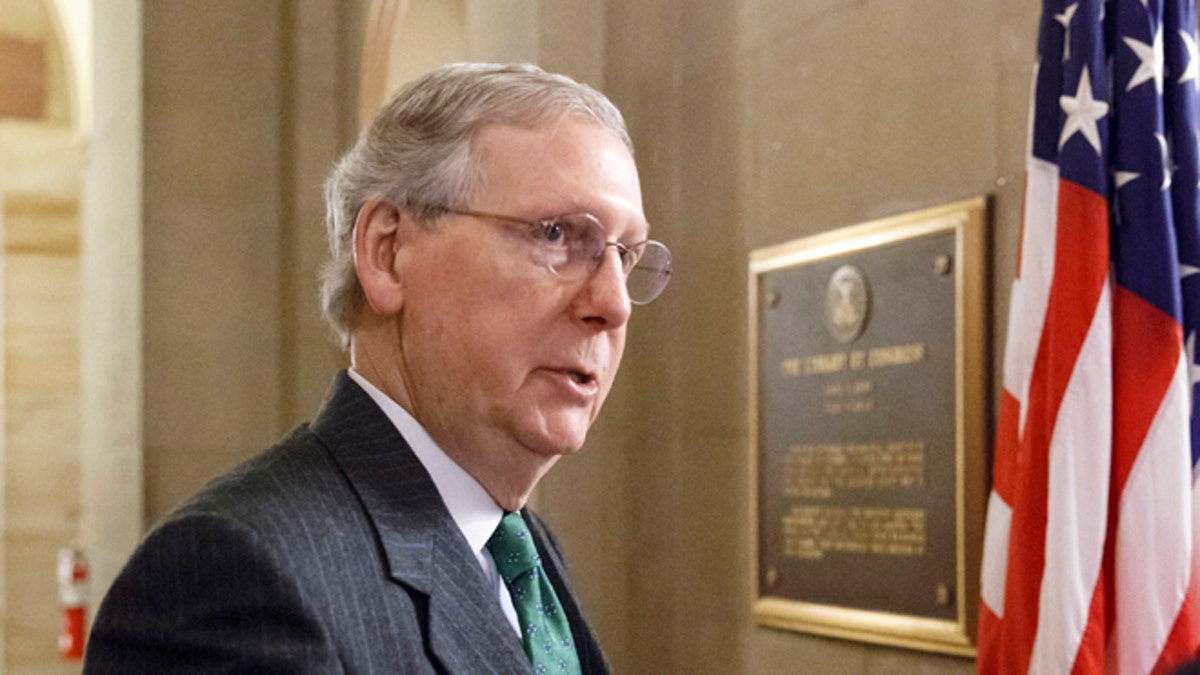
Monday, Jan. 5, 2015 photo of incoming Senate Majority Leader Mitch McConnell of Ky. outside his office on Capitol Hill in Washington. (AP)
The rhythms of life change in September.
Summer vacation is over. It's back to school. Back to work. The big stretch until the next major temporal marker, Thanksgiving.
Congressional rhythms change in September, too.
This September is no exception, and could prove to be exceptional considering how much work faces Congress when it returns to session in a couple weeks.
Historically, Congress takes a "European" approach to August. Neither the House nor Senate meets at all unless it's an emergency.
That's why this September promises to be epic. There is so much congressional work to knock out in September. One might question the wisdom of lawmakers to abandon Washington for weeks when so much of the nation's business lies at stake.
Here's a thumbnail at the congressional docket for September:
- Lawmakers will debate and vote "yes" or "no" on a resolution to disapprove the Iran nuclear agreement.
- Members of Congress must figure out a way to avoid a partial government shutdown by Oct. 1, the start of the government's new fiscal year. With so many Senate presidential contenders, the 2016 sweepstakes could complicate this debate.
- Congress plays host to a visit by Pope Francis as he speaks to a Joint Meeting of Congress. No Pope has ever delivered such an address on Capitol Hill.
The September calendar is truncated with both the House and Senate not returning to session until after Labor Day. Plus, the conduct of practically all congressional business is then interrupted immediately -- twice -- by the Jewish holidays of Rosh Hashanah and Yom Kippur. The Pope shows up right after that's concluded.
Cutting town for the month of August? And knocking out all of this business before Oct. 1? One could certainly make a case that Congress should have attended to some of this business beforehand or returned from the August recess early. That, though, cuts against the grain of one of the most powerful forces in Congress: nothing ever gets done unless there's a deadline. And Congress faces major deadlines on Iran and government spending next month.
Let's start with Iran.
Senate Majority Leader Mitch McConnell, R-Ky., promises a robust Iran debate, permitting all senators to have their say. He's even requested senators sit at their desks and listen to their colleagues. It will take time to do this well. However, time is not really something Congress has right now. Both the House and Senate have until Sept. 17 to "disapprove" of the Iran pact and send the measure to President Obama for his veto. Presuming that's the case, Congress then has but a few days to attempt to override the veto.
Of course, Congress could ironically save time in this entire process. If either the House or Senate fails to muster the votes to disapprove the Iran package, the entire point is moot. The international agreement goes forward without congressional intervention. That scenario is not out of the question.
Now to spending.
Both the House and Senate have sent precisely zero of the 12 annual spending bills which fund the federal government to Obama to either sign or veto. If any of those 12 bills aren't signed by the president by Oct. 1, that portion of the government shuts down.
Sound familiar?
Funding ObamaCare forced the 2013 government shutdown. There are a host of issues which could serve as trip wires this time around. Conservatives want to yank funding for Planned Parenthood, Obama's executive orders on immigration, and environmental policy, among others. And for the moment, lawmakers still fund ObamaCare. Don't forget liberals in the House brought the appropriations process to a standstill in July over the placement of Confederate flags at national cemeteries.
Again, time is something Congress doesn't have. Conservatives will absolutely berate McConnell and House Speaker John Boehner, R-Ohio, if they don't at least attempt to defund some of the conservative priorities. Keep in mind the Senate unsuccessfully tried to defund Planned Parenthood in July, but failed to garner enough votes to even put such a bill on the floor.
House and Senate leaders don't even have much time with which to conduct show votes on these issues. And, even doing the real thing takes time, too.
Could there be another shutdown crisis? McConnell has repeatedly said those days are long over. But there's sparse time to solve this. Interestingly, some conservatives now wonder if shutting down the government is such a bad proposition after all. Certainly the public blamed Republicans for the 2013 shutdown. Then-House Speaker Newt Gingrich, R-Ga., and the GOP also scored the blame for the shutdowns of 1995-96. But some Republicans point to the election results of 2014. Republicans now hold the largest majority in the House of Representatives since the late-1920s and seized control the Senate after eight years of Democratic rule.
How bad can it be? some ask.
And then there is the Pope.
Perhaps it is only appropriate that Pope Francis's visit to the Capitol comes at the end of September -- right as the government funding deadline arrives and Congress faces the possibility of a deadline to override the president on the Iran pact.
Lawmakers may need of counsel from the Holy Father by that point of the month anyway.
Capitol Attitude is a weekly column written by members of the Fox News Capitol Hill team. Their articles take you inside the halls of Congress, and cover the spectrum of policy issues being introduced, debated and voted on there.












































